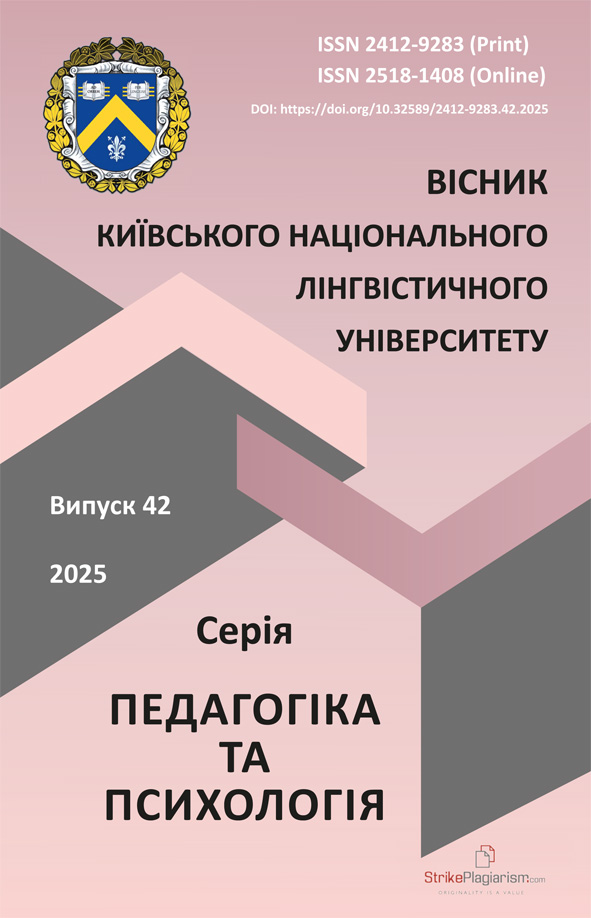Вікові та когнітивні аспекти розвитку іншомовної аудитивної компетентності в дорослих
DOI:
https://doi.org/10.32589/2412-9283.42.2025.334887Ключові слова:
іншомовна аудитивна компетентність, когнітивне навантаження, дорослі учні, стратегії навчання, вікові обмеженняАнотація
У статті проаналізовано вплив віку на іншомовну аудитивну компетентність, проаналізовано гіпотезу критичного періоду та роль когнітивних факторів у поліпшенні аудитивної компетентності дорослих учнів. Розглянуто неоднозначні результати досліджень щодо вікових обмежень, а також роль деяких когнітивних аспектів. Подано огляд навчальних стратегій щодо покращення аудіювання та інших мовних навичок у дорослих, які контролюють, спрямовують і регулюють процес навчання, сприяють усвідомленню, плануванню, моніторингу та оцінюванню власного прогресу. Особливу увагу приділено впливу когнітивного навантаження на процес засвоєння мови. Проаналізовано основні види когнітивного навантаження (внутрішнє, зовнішнє, питоме) та підкреслено важливість оптимізації навчальногоосвітнього процесу для зменшення зовнішнього когнітивного навантаження та збільшення питомого когнітивного навантаження, що сприяє ефективному засвоєнню мови. Визначено, що, хоча вік є важливим чинником, дорослі учні можуть компенсувати вікові обмеження за допомогою ефективних когнітивних стратегій та оптимізації навчального процесу. (Так само!)
Посилання
Anderson, N. (2003). Meta-cognitive reading strategies increase L2 performance. The Language Teacher, 27, 20–22.
Artino, A. R., Jr. (2008). Cognitive load theory and the role of learner experience: An abbreviated review of educational practitioners. Association for the Advancement of Computing in Education Journal, 16(4), 425–439.
Birdsong, D. (2017). Critical periods. In: M. Aronoff (Ed.), Oxford Bibliographies in Linguistics. Oxford University Press.
Birdsong, D. (2018). Plasticity, variability and age in second language acquisition and bilingualism. Frontiers in Psychology, 9, 81.
https://doi.org/10.3389/fpsyg.2018.00081
Bubbico, G., Chiacchiaretta, P., Parenti, M., di Marco, M., Panara, V., Sepede, G., Ferretti, A., & Perrucci, M. G. (2019). Effects of second language learning on the plastic aging brain: Functional connectivity, cognitive decline, and reorganization. Frontiers in Neuroscience, 13, 423.
https://doi.org/10.3389/fnins.2019.00423
DeLeeuw, K. E., & Mayer, R. E. (2008). A comparison of three measures of cognitive load: Evidence for separable measures of intrinsic, extraneous, and germane load. Journal of Educational Psychology, 100(1), 223–234.
https://doi.org/10.1037/0022-0663.100.1.223
Elise, Y. W. (2022). A brief review of the effects of age on second language acquisition: Is younger better? Journal of Language Teaching, 2(1), 1–5.
https://doi.org/10.54475/jlt.2022.001
Hartshorne, J. K., Tenenbaum, J. B., & Pinker, S. (2018). A critical period for second language acquisition: Evidence from 2/3 million English speakers. Cognition, 177, 263–277.
Henry, M., Herrmann, B., Kunke, D., & Obleser, J. (2017). Aging affects the balance of neural entrainment and top-down neural modulation in the listening brain. Nature Communications, 8(1).
https://doi.org/10.1038/ncomms15801
Huang, B. H. (2015). A synthesis of empirical research on the linguistic outcomes of early foreign language instruction. International Journal of Multilingualism, 13(3), 257–273. https://doi.org/10.1080/14790718.2015.1066792
Hulstijn, J. H. (2015). Language proficiency in native and non-native speakers: Theory and research. John Benjamins Publishing Company.
https://doi.org/10.1075/lllt.41
Johnson, J. S., & Newport, E. L. (1989). Critical period effects in second language learning: The influence of maturational state on the acquisition of English as a second language. Cognitive Psychology, 21(1), 60–99.
https://doi.org/10.1016/0010-0285(89)90003-0
Kim, M., Nam, Y., & Crossley, S. A. (2022). Roles of working memory, syllogistic inferencing ability, and linguistic knowledge on second language listening comprehension for passages of different lengths. Language Testing.
https://doi.org/10.1177/02655322211060076
Lenneberg, E. H. (1967). Biological foundations of language. John Wiley and Sons, Syst. Res., 13: 493–495. https://doi.org/10.1002/bs.3830130610
Li, Y., & Zhang, X. (2019). L2 vocabulary knowledge and L2 listening comprehension: A structural equation model. Canadian Journal of Applied Linguistics, 22(1).
https://doi.org/10.7202/1060907ar
Masrai, A. (2021). The relationship between two measures of L2 phonological vocabulary knowledge and L2 listening comprehension. TESOL Journal, e612.
https://doi.org/10.1002/tesj.612
O’Malley, J., & Chamot, A. (1990). Learning strategies in second language acquisition. Cambridge University Press.
Pass, F., Renkl, A., & Sweller, J. (2003). Cognitive load theory and instructional design: Recent developments. Educational Psychologist, 38(1), 1–4.
Patkowski, M. S. (1980). The sensitive period for the acquisition of syntax in a secondary language. Language Learning, 30(2), 449–468.
Penfield, W., & Roberts, L. (1959). Speech and brain mechanisms. Princeton University Press.
Rost, M. (2016). Teaching and researching listening. Routledge.
Sawaya, Y. (2018). The influence of working memory capacity and background knowledge on cognitive load and L2 lecture comprehension. International Journal of Language Learning and Applied Linguistics World, 19(3), 1–13.
Sierens, S., Van Gorp, K., Slembrouck, S., & Van Avermaet, P. (2021). The strength of cross-language interdependence for listening comprehension proficiency in Turkish–Dutch emergent bilinguals: Testing three hypotheses. Language Learning, 71(2), 453–486.
https://doi.org/10.1111/lang.12441
Stankova, E., Hruby, M., & Hasilova, K. (2022). Is listening comprehension in a foreign language affected by age? Journal of Language and Education, 8(1), 167–180.
https://doi.org/10.17323/jle.2022.11292
Sweller, J. (1988). Cognitive load during problem solving: Effects on learning. Cognitive Science, 12(2), 257–285.
Sweller, J. (1994). Cognitive load theory, learning difficulty, and instructional design. Learning and Instruction, 4, 295–312.
Sweller, J. (2010). Element interactivity and intrinsic, extraneous, and germane cognitive load. Educational Psychology Review, 22, 123–138.
Vandergrift, L. (1996). The listening comprehension strategies of core French high school students. Canadian Modern Language Review, 52, 200–223.
Vandergrift, L. (1997). The strategies of second language (French) listeners: A descriptive study. Foreign Language Annals, 30, 387–409.
Vanhove, J. (2013). The critical period hypothesis in second language acquisition: A statistical critique and a reanalysis. PLOS ONE, 8(7), e69172.
https://doi.org/10.1371/journal.pone.0069172
Whitehead, E. (2020). Application of meta-cognitive strategy instruction in listening comprehension to the Level III student teachers. The Excellence in Education Journal, 9(1), 104–119.
Yu, X., Janse, E., & Schoonen, R. (2021). The effect of learning context on L2 listening development: Knowledge and processing. Studies in Second Language Acquisition, 43(2), 329–354.
https://doi.org/10.1017/S0272263120000534
Zhang, C. (2009). A study of age influence in L2 acquisition. Asian Social Science, 5(5), 133–137.


